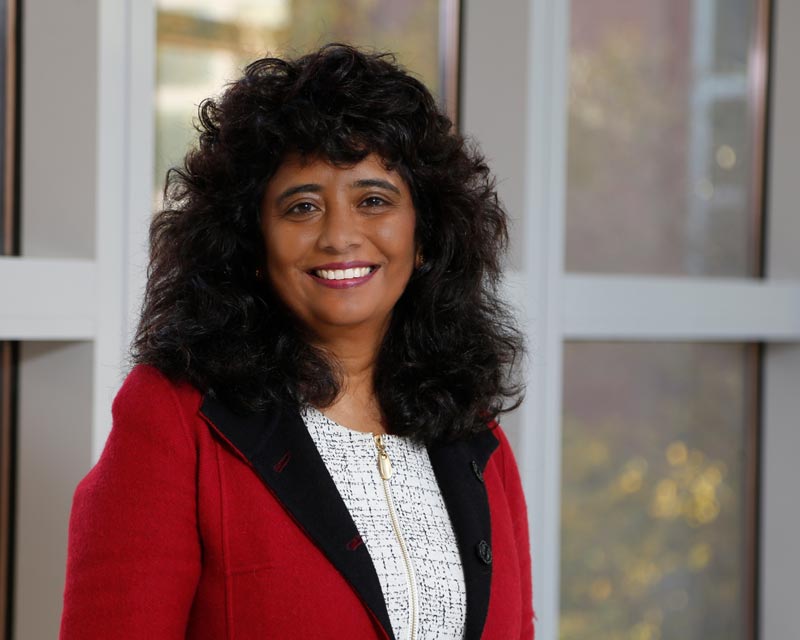
Comprehensive Esophageal Health Center opens with more convenient, streamlined care
 Expert in cyclic vomiting syndrome aims to educate providers and researchers while improving patient outcomes
Expert in cyclic vomiting syndrome aims to educate providers and researchers while improving patient outcomesOne of the world’s foremost experts in cyclic vomiting syndrome is bringing her expertise to The Ohio State University Wexner Medical Center.
Ohio State recruited Thangam Venkatesan, MD from the Medical College of Wisconsin, where she built an internationally recognized center for treating cyclic vomiting syndrome (CVS) in adults.
Her directive is to build a powerhouse program in Neurogastroenterology and Motility at Ohio State. She serves as a professor in the Division of Gastroenterology, Hepatology and Nutrition at The Ohio State University College of Medicine and as director of Neurogastroenterology and Motility.
Venkatesan has keen insight into diagnosing and managing CVS. She volunteers for the Cyclic Vomiting Syndrome Association and helped the National Institutes of Health develop its web content for CVS.
Venkatesan says her goal is to expand and grow her Ohio State division into one of the country’s Centers of Excellence in Neurogastroenterology and Motility.
Disorders of gut-brain interaction (DGBIs) are a complex group of chronic gastrointestinal (GI) conditions that affect approximately 1 in 4 individuals in the United States. These disorders, a significant public health problem, are thought to occur because of a miscommunication between the brain and the GI tract. CVS is one such DGBI and is characterized by unexplained recurrent episodes of nausea and vomiting.
These disorders are not well understood by the health care field. Venkatesan says that she is determined to educate her colleagues, future providers, patients, families and policy makers about these complex disorders and realign health care delivery to optimize patient care.
“First, patients need to be treated with an integrative health care model that is patient centered and focused, alongside research to really improve their lives,” Venkatesan says.
While she does treat people with other motility and related conditions, the bulk of Venkatesan’s clinical care focuses on CVS because many patients seek her out. It started 18 years ago when Venkatesan cared for a patient.
“She was marginalized and out there, and I was able to help her turn things around,” Venkatesan says.
That experience shaped her career. Venkatesan started a clinic for CVS patients at the Medical College of Wisconsin. The condition was then considered a pediatric disorder, but we now have data that it is as common in adults. Venkatesan treats adults with CVS, and patients came to see Venkatesan from all over the U.S. She developed an integrated care model with a team of nurse practitioners, nurses, dietitians and other providers.
At Ohio State, Venkatesan plans to establish more resources for CVS and other DGBIs, such as:
“It’s about finding good physicians with a deep understanding who care for their patients,” Venkatesan says. “It’s not about just procedures; it’s about taking time to have a focused interview with a patient to fully understand their lives.”
Venkatesan comes to Ohio State after more than 15 years in the field. She completed her residency and fellowship training at the University of Cincinnati, then spent time in India “to see if I could cure the world” before going to the Medical College of Wisconsin.
Despite years of working to educate others about CVS, Venkatesan continues to encounter patients who go undiagnosed because physicians don't recognize the signs of cyclic vomiting.
One of the first papers Venkatesan authored, in 2004, explained how 95% of patients who went to the emergency room with CVS symptoms weren't properly diagnosed. Some patients went to the ER 200 times.
“It’s important to focus on the research data to illustrate the problem,” Venkatesan says.
In 2019, she used her experience in treating CVS to write guidelines for the management of CVS in adults. She chaired a committee under the auspices of the American Neurogastroenterology and Motility Society and the Cyclic Vomiting Syndrome Association. She hopes to have these guidelines translated into Spanish soon, recognizing the need to treat these patients all over the world and share resources that we are fortunate to have in the U.S. Venkatesan says physicians must:
Patients might be unable to access treatment because of inadequate health insurance, a lack of transportation or simply feeling overwhelmed by the complexity of the health care system. Some patients encounter discrimination because of their cannabis use, Venkatesan says.
“We need consistency,” Venkatesan says. “Even the medical community is unaware of all of these issues. These patients suffer enormously, often are turned away from the ER and are called drug addicts.”
Venkatesan says she cares deeply about educating teachers, medical students, residents, fellows and faculty about all aspects of CVS. She’s on a mission to train advanced practice providers, emergency department physicians and hospitalists to help streamline care for CVS around the world.
Research plays an important role in Venkatesan’s work. She’s involved in multiple clinical trials and studies to understand the pathophysiology and CVS-focused treatment.
She’s studying the body’s endocannabinoid system, which signals cells so the body can respond to pain or inflammation. Endocannabinoids are substances made by the body that are like cannabis and are vital to helping humans combat stress and also important in the regulation of nausea and vomiting.
Venkatesan’s translational work aims to understand more about how the endocannabinoid system works and how this might be altered in patients with CVS and related disorders. In fact, this knowledge could help develop therapies that target this system and help treat symptoms of CVS.
Other research efforts include:
“There are many exciting drugs and developments in the pipeline for CVS, but federal funding is lacking,” Venkatesan says. “I’m hopeful we can break the barrier on that.”
Venkatesan believes the future of health care for DGBIs is improving.
“People are beginning to understand that there is a need to treat these patients holistically and that there is an urgent need for education and research in this area,” Venkatesan says.
As one of the chief medical advisors for the Cyclic Vomiting Syndrome Association, and through her work with the American Neurogastroenterology and Motility Society and other nonprofit organizations like the International Foundation of Functional GI disorders, Venkatesan impacts CVS care on a global scale.
She works with colleagues in Canada, Chile, Honduras, Japan and the United Kingdom, to name a few.
“Running after the next shiny toy is not the answer to human health,” Venkatesan says. “Only 10% of what a patient is dealing with is determined by the clinic visit.”
As a child, Venkatesan learned how important significant face-to-face interactions with patients are while tagging along with her physician father when he made house calls.
“He got to know the person and what’s happening at their home and with their family and how it affects them,” she says.
Venkatesan believes health care needs to move back toward that model. When physicians and the other health care providers on a patient’s care team address the multiple social and economic determinants of health an individual lives with, it can make a huge impact on how people feel and function in society. At the same time, undue administrative burdens imposed on physicians should be addressed, she says, to rekindle the joy of taking care of patients.
Physicians need to understand these inequities and how to address them, Venkatesan says, because “the current health care model is not translating into good patient care.”
“That is what I see as the next step at Ohio State,” Venkatesan says. “We need to inform policy makers about the value of appropriate care, and we need a collaborative health care delivery team to treat all facets of a patient’s health.”